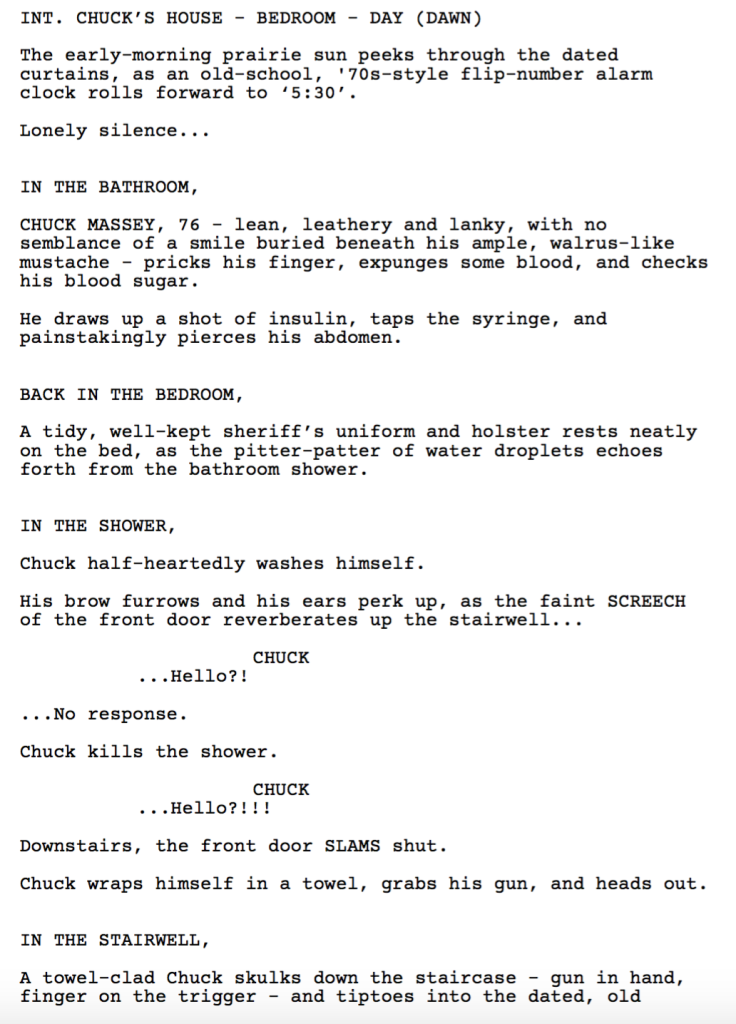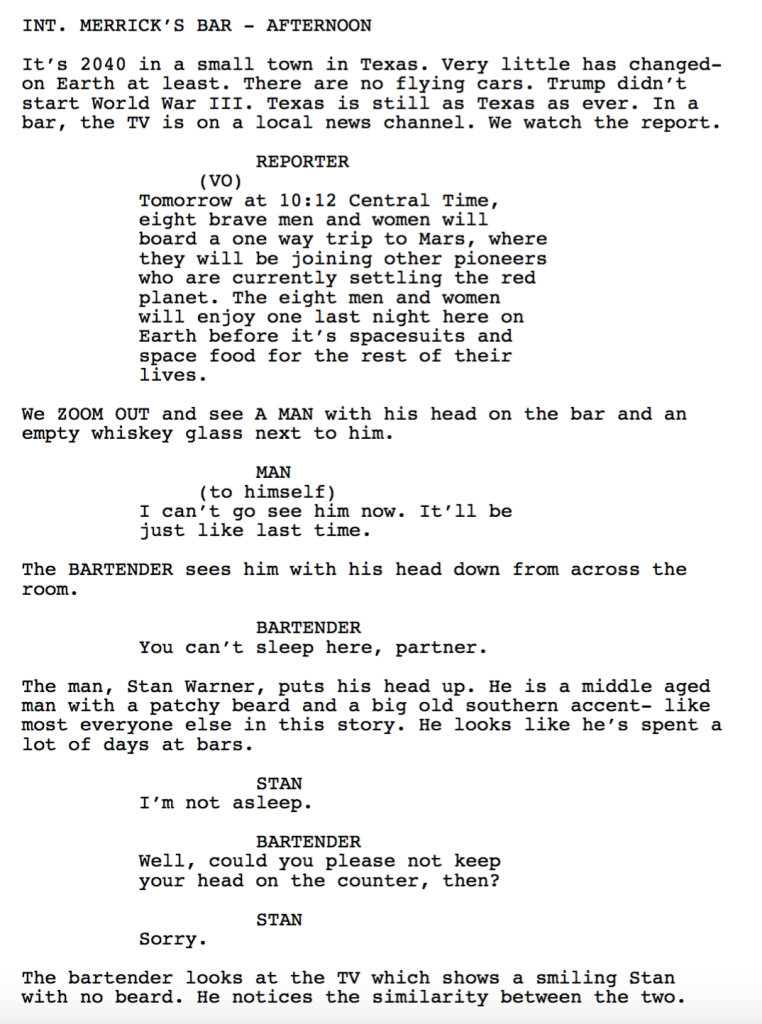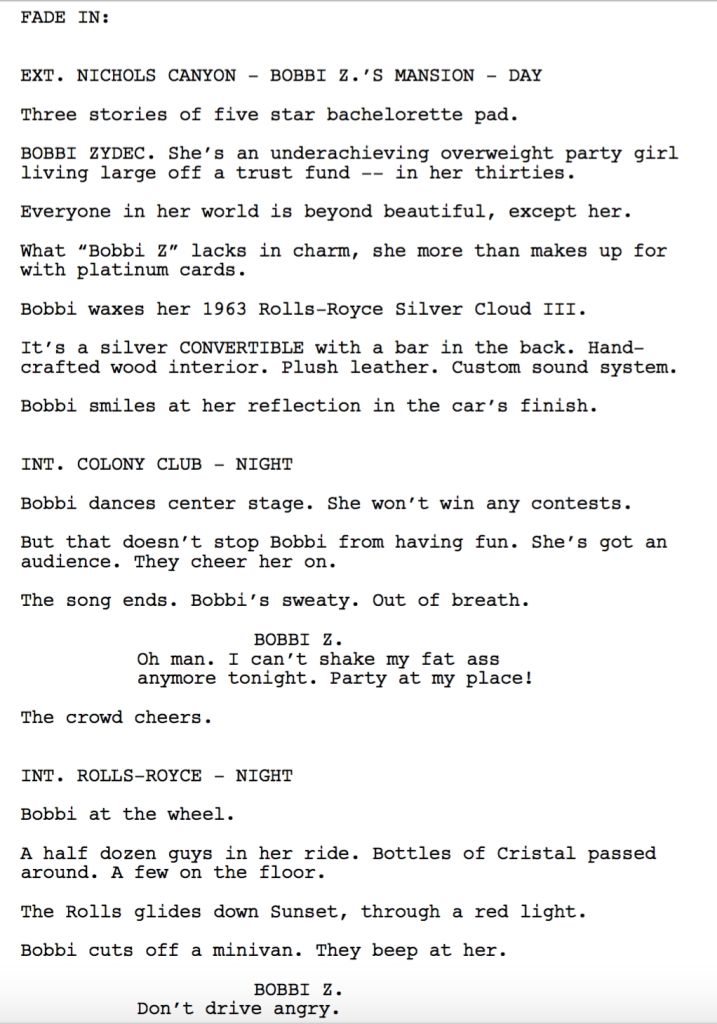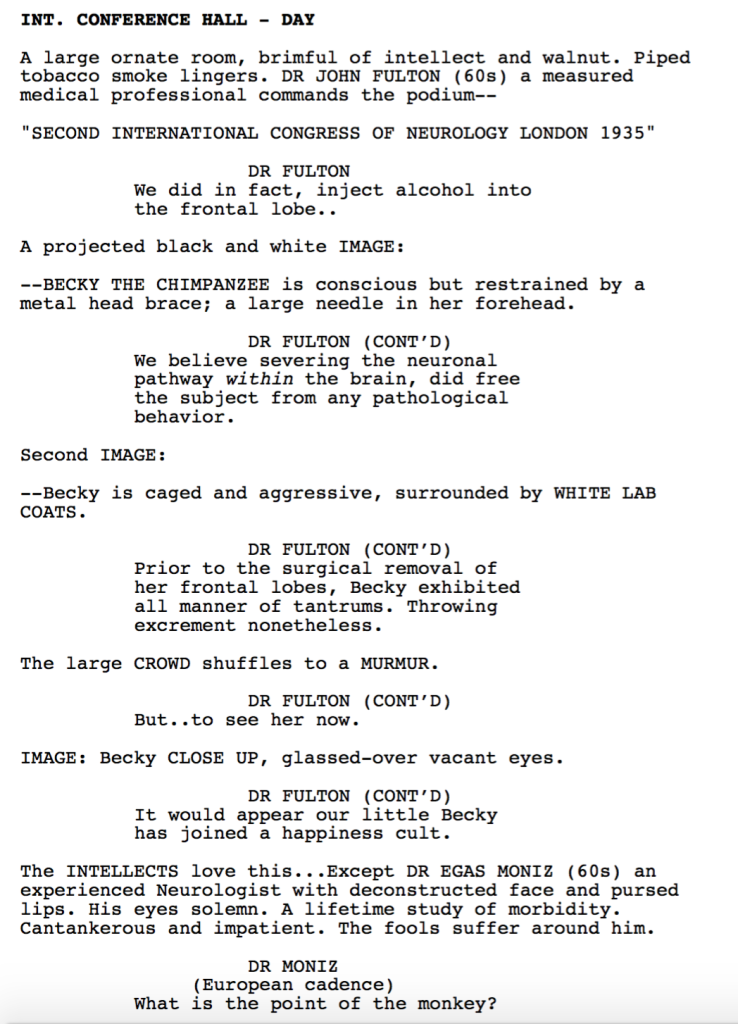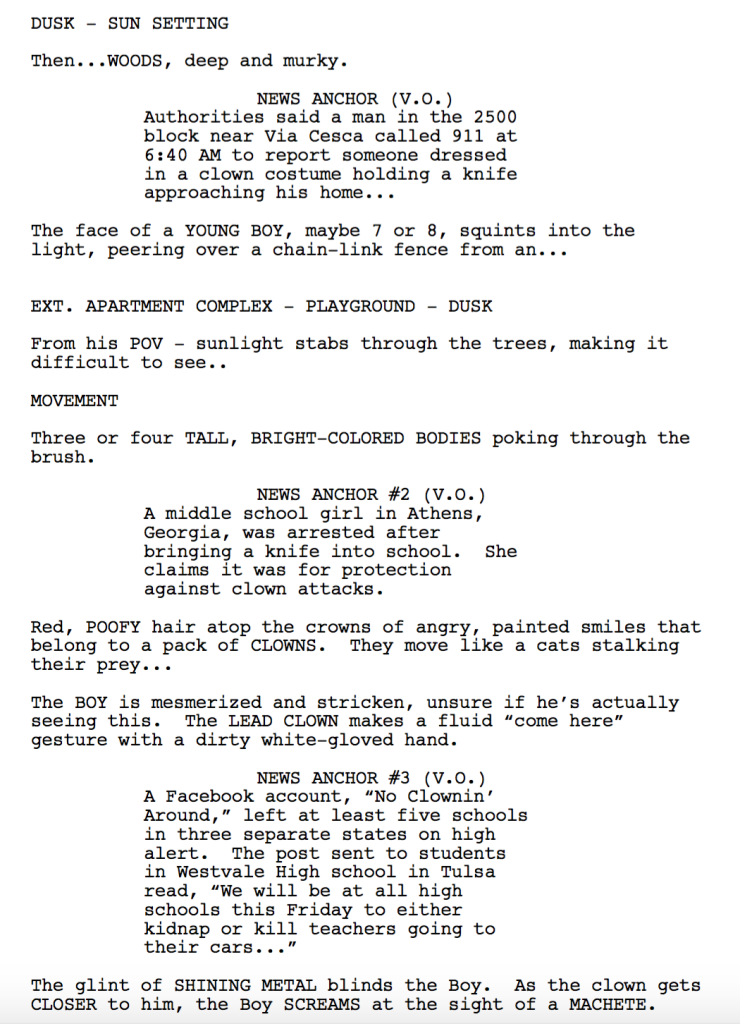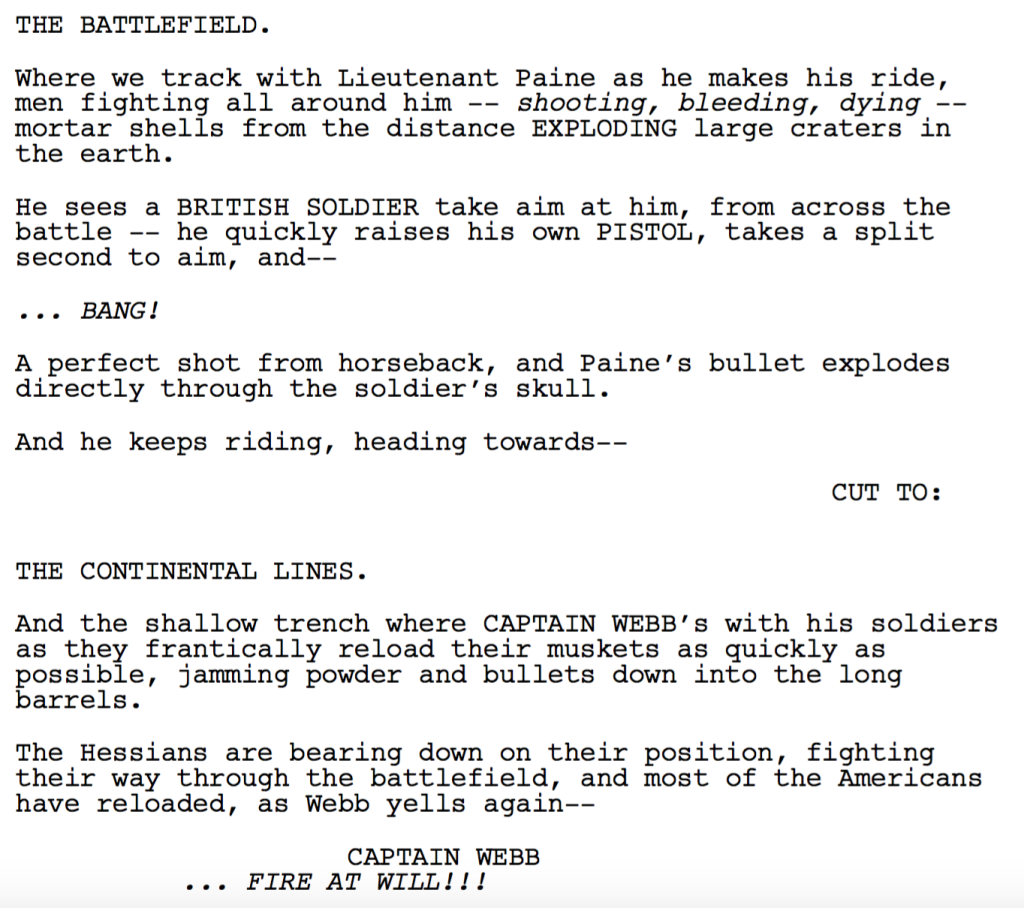Search Results for: the wall
Genre: Crime Drama/Action
Logline (from writer): When a routine prison transfer turns into a precarious hostage situation at a rural gas station & grill, a curmudgeonly small-town sheriff on the cusp of retirement must team up with a hardened Native American inmate to dodge gunfire and keep each other alive as a rebellious pack of insubordinates seek to finish off the ‘old guard.’
Why You Should Read: Here’s what the Blacklist’s story analyst had to say about my script: “The story is rife with conflict and remains engaging from beginning to end, and the dialogue is really strong. The relatively contained setting also makes this a more affordable film to produce – especially considering the amount of action – which can open up wider range of potential financiers. And, the best crime dramas can absolutely draw large audiences; this is a very commercial film.”
I feel like it’s ‘almost there’; it’s been read by some reputable companies (like Screen Gems, Blumhouse, WWE Studios, etc.), and it’s helped me get some of my other scripts in a few reading piles on the strength of my writing voice, but thus far, no one’s pulled the trigger and said ‘Yes, I’d like to option this’.
It’s a little different (which can be refreshing in a genre like crime drama / action); it borrows more cues from movies like ‘The Breakfast Club’ than it does from movies like ‘Die Hard’. I want to keep the emphasis on the characters in a way that isn’t boring, in the sense that ‘The Breakfast Club’ isn’t primarily a movie about a bunch of kids trying to sneak out of detention (although they do, in fact, sneak out of the library at one point). Would love any and all feedback from the Scriptshadow universe. Thanks in advance for your consideration!
Writer: Trevor Lanz
Details: 104 pages
Usually, after I finish reading the Amateur Friday winner, I know exactly what I’m going to say. But this one was different. The script was well-written. It was coated with that professional screenwriter sheen. But it wasn’t landing with me the way I needed it to. So I went back to the comments to see what you guys thought, and that helped.
The conclusion I came to is that there’s something a little too comfortable about the execution. While I never knew exactly where the story was going, I had a good idea. And that’s because the plot never evolved that much. A big reason for this was that we’re sitting in the same spot for 50 pages – two characters behind a truck. That’s hard to make work, even for a 1 Mil Per Assignment screenwriter.
The Last Shot follows 76 year old diabetic sheriff Chuck Massey on his last day of work. Chuck plans to sit back, listen to the background noise of the phone ringing every 90 minutes, then call it a career.
Unfortunately, the state police call in to ask Chuck and his sketchy deputy, Travis, to watch a transferred prisoner for 30 minutes while the driving team has their mandated lunch break in their town.
So Chuck and Travis head over to The Last Stop diner, where our transfer truck is having lunch, and wouldn’t you know it, four bad men – Snipes, Kyle, Big Pabi, and J-Lo – are there to kill the prisoner being transferred, a Native American named Johnny, who Chuck ironically put in prison a decade ago.
Chuck is able to stave off the bad guys and save Johnny from the initial kill, but now the bad guys and Deputy Travis – who it turns out was working with them all along – are inside with a dozen hostages. Travis yells out at his boss that he’s going to start killing hostages unless he can kill Johnny, who we find out is going to rat out a bunch of drug dealers.
Chuck and Johnny then spend the entire day in a stand-off with the crew, hiding behind the transfer truck, and trying to come up with a plan so that Crazy Travis doesn’t keep killing people. Eventually, it’s “shit or get off the pot” time, they charge in, violence ensues, and they’re able to kill Evil Travis.
However, now that the bad guys are taken care of, Chuck and Johnny’s alliance is over. Put plainly, that means Johnny doesn’t need Chuck’s help anymore. Will he continue on with Chuck to court? Or will he kill him and run free?
So yeah, I can tell you where this script ran into trouble with me.
It was about 20 pages into Chuck and Johnny sitting behind that truck. I’ll tell you why. When you’re staying with two characters for that long, the audience needs to understand what the conflict is between those characters that needs to be resolved. We need this because these characters are the story within the story. Their “end point” is essentially the climax of the film. So if I don’t know what it is they’re trying to come to an agreement on, then the story has no direction.
I never knew what that was with these two. I’m not saying the writer didn’t know. But I didn’t. And if I don’t have that, then I’m just listening to two people talk for 50 pages. And that’s hard for a writer to keep entertaining.
I’ll give you a popular relationship example of what I mean. Iron Man and Spider-Man. What are they always going on about? Spider-Man thinks he’s ready. Iron Man is trying to explain to him that it takes time. That’s their dynamic in Homecoming. That’s their dynamic in Infinity War. Wherever they go, everything comes back to that conversation. And so I always knew what it was they needed to resolve.
Plus, I just don’t think it’s a good idea to put two characters in that limited of a location for that long. You’re making things so hard on yourself as a writer. This script needed a couple of more plot twists in the second act. And it needed a couple more location changes for those two as well.
I mean I love how confident Trevor was that he thought he could get away with this. But you have to be realistic.
I also agree with a few of the commenters that Travis’s plan was murky. I eventually figured it out. But way later (page 75?) than I needed to. I mean, I wasn’t even clear, at first, that Travis wanted Chuck to hand over Johnny so they could kill him. Or why Travis wanted Johnny killed in the first place.
I know screenwriters are afraid of big exposition scenes but when it comes to “THE PLAN,” that’s something that’s got to to be clear to the audience from the start, unless you’re deliberately keeping plot points a mystery, which I don’t think was the case here (I may be wrong).
A big change that could really help this script is to make Chuck and Johnny more active. They end up sitting there doing NOTHING for hours on end, while innocent people keep getting shot (Travis kills a hostage every half-hour that Chuck doesn’t turn Johnny over). Going the simple route of having these two DO MORE to fix their situation, you get them out from behind that truck and you have yourself a more evolving plotline, as opposed to a static one.
I should also point out that this is a hard analysis to be 100% sure on. Because if I liked the relationship stuff more, I probably wouldn’t have minded that we spent so much time behind the truck. But because I didn’t, I focused more on the lack of variety in the plot. So you never know. Maybe you fix the characters stuff and then the plotting isn’t as much of a problem.
Still, my gut’s telling me that a more active plot with additional twists and more movement is what the doctor ordered. Despite that criticism, I want to be clear that I think Trevor is a strong writer. I’m not surprised he ran away from the competition. But he specifically asked why we think the script has hit a wall. And this would be my guess.
Script Link: The Last Shot
[ ] What the hell did I just read?
[x] wasn’t for me
[ ] worth the read
[ ] impressive
[ ] genius
What I learned: Static Introductions – A static introduction is when you introduce a character just to introduce him. He isn’t doing anything. These are the hardest characters for readers to remember, even if they’re described well. Readers associate characters with their actions, so it’s best to introduce characters doing something if possible. Bad guys Snipes, Kyle, Big Pabi, and J-Lo all had static introductions, so it wasn’t a surprise that I never had a good feel for them as characters throughout the script.
I’m still trying to figure out how a McDonald’s Monopoly article became one of the hottest projects in town, seemingly overnight. As a screenwriter, it’s your job to take note of what A-list actors and directors are drawn towards so that you can use that knowledge in deciding what you yourself should write to attract similar talent. I don’t know why this one is garnering so much interest though. It seems dumb. What’s not dumb? Reading and voting on this weekend’s Amateur Offerings scripts!
For those playing for the first time, Amateur Offerings asks you to read as much as you can from each script and vote for your favorite in the comments section. The script with the most votes will receive a review next Friday!
And if you believe you have a screenplay that’s better than anything Hollywood is making at the moment, submit it for a future Amateur Offerings! Send me a PDF of your script, along with the title, genre, logline, and why you think people should read it (your chance to pitch yourself or your story). All submissions should be sent to Carsonreeves3@gmail.com.
Title: THE LAST SHOT
Genre: Crime Drama/Action
Logline: When a routine prison transfer turns into a precarious hostage situation at a rural gas station & grill, a curmudgeonly small-town sheriff on the cusp of retirement must team up with a hardened Native American inmate to dodge gunfire and keep each other alive as a rebellious pack of insubordinates seek to finish off the ‘old guard.’ (Tonally, somewhat in the vein of ‘Hell or High Water’, ‘Wind River’, ‘Gran Torino’, or ‘No Country for Old Men’.)
Why You Should Read: Here’s what the Blacklist’s story analyst had to say about my script: “The story is rife with conflict and remains engaging from beginning to end, and the dialogue is really strong. The relatively contained setting also makes this a more affordable film to produce – especially considering the amount of action – which can open up wider range of potential financiers. And, the best crime dramas can absolutely draw large audiences; this is a very commercial film.”
I feel like it’s ‘almost there’; it’s been read by some reputable companies (like Screen Gems, Blumhouse, WWE Studios, etc.), and it’s helped me get some of my other scripts in a few reading piles on the strength of my writing voice, but thus far, no one’s pulled the trigger and said ‘Yes, I’d like to option this’.
It’s a little different (which can be refreshing in a genre like crime drama / action); it borrows more cues from movies like ‘The Breakfast Club’ than it does from movies like ‘Die Hard’. I want to keep the emphasis on the characters in a way that isn’t boring, in the sense that ‘The Breakfast Club’ isn’t primarily a movie about a bunch of kids trying to sneak out of detention (although they do, in fact, sneak out of the library at one point). Would love any and all feedback from the Scriptshadow universe. Thanks in advance for your consideration!
Title: The Final Frontier
Genre: Drama/Sci-Fi
Logline: On the last night before he permanently relocates to Mars, a disgraced astronaut struggles to settle his final affairs at home with his father, his kids, and his ex-wife.
Why You Should Read: I am an aspiring screenwriter and while I’ve gotten positive feedback from some other writers and from my friend who’s a development exec, I feel like I need some better notes on my material so that I can improve it enough to get repped. My script would technically fall under the Sci-Fi genre, but it is way more Richard Linklater than it is James Cameron. It is a family drama at its core, and ultimately depends on characters resonating with the audience and the dialogue being well-written in order for it to be successful. I’d like for you (and everyone who visits your site) to be the judge to decide whether I made it work. I urge you to give me a shot.
Title: Repossession
Genre: Comedy
Logline: When a mama’s boy buys an exotic car that’s haunted by a rich obnoxious party girl, the ghost won’t rest in peace while this stubborn five star loser owns her sweet ride.
Why You Should Read: My friends keep telling me I need to “live a little”. That I should get out more instead of staying in and writing scripts all the time. But instead of being more social and learning how to live a little, I decided to write a script about someone with the same problem lol. I thought it would be interesting to share this now because it’s basically the same concept as the recent AO contender, THE CAR, but my ghosts are played for laughs. What a coincidence! They say timing is everything. So, I decided to live a little and share my script with all the generous folks here on SS!
Title: Before I Forgot
Genre: Drama/Horror
Logline: The compelling true story of Dr Walter Freeman, a narcissistic egotist that convinced America his lobotomy procedure could cure everything from depression to the common cold. Thousands of returning soldiers and Rosemary Kennedy were amongst his ‘satisfied’ clients.
Why You Should Read: This little ‘slice’ of American history needs to be told to the masses. The more I researched this guy, the more I became entrenched by his audacity and the more I empathized with his victims, especially the American war heroes returning after WW2 with mental health issues. The mental health system in America was imploding. Dr Walter Freeman played God. Its a heavy subject matter. I wrote this script a while ago and feedback was that it would never get made into a movie in America, given the sensitivity of the Kennedy family and of course the fate of Rose Kennedy. Nothing like some controversy to propel a script. Thanks for your support and feedback. I hope I’ve done the story justice.
Title: Followers
Genre: Crime/Thriller
Logline: When a Philadelphia detective discovers her son belongs to a group of clowns terrorizing a suburban neighborhood, her attempts to protect him ignite a string a death and violence that threatens to swallow them, and the entire city, whole.
Why You Should Read: Followers is inspired by the pre-election clown hysteria of 2016. I decided to take that insanity and make it even more insane and tell it through a hyper-realistic crime thriller. Listen to Marilyn Manson’s “Mobscene” right before you read it and you’ll get an idea of the tone of this thing. Enjoy, I hope.
One of the worst things that can happen in screenwriting is to write a script and then, 45 pages in, 60 pages in, 75 pages in… you run out of ideas. You don’t know where the story should go. You stare at the screen, you rack your brain, but no matter how hard you try, you don’t see any way to complete the story. Maybe, you say to yourself, the idea was never good enough to begin with. Maybe there was nothing here from the start. And while that may be true, running out of ideas during a screenplay is a common problem. Sometimes the brain just stops working. The good news is, there are ways to combat this.
First of all, the biggest reason we run out of steam during a screenplay is because we didn’t outline. Outlining helps us see if the story has legs. If you’re not a fan of the outline, that’s fine. But I would still implore you to write down four major checkpoints in your script before you start writing it. What happens at the end of the first act (the launching point). What happens at the midpoint (a twist or major event that shakes your story up). What happens at the end of the second act (the lowest point). And your ending.
If you have these figured out beforehand, you’ll always have something visible to write towards. A big reason we run out of ideas is because the void in front of us is too big, too uncertain. We see 60-70 pages ahead of us and there aren’t enough ideas in the world to fill that up. But if our next pre-determined checkpoint is never more than 30 pages away, that feels more manageable. We can come up with enough ideas to get to that point.
But let’s say you’ve outlined your script only to find that, midway through the writing process, your outline was wrong. Or maybe you had a better idea that spun the story in a different direction, and now your outline is worthless. This happens all the time. Storytelling is malleable. You get new ideas. You follow new paths. You find yourself in unexpected territory constantly. So even if you had the best intentions and did things “right,” you can still find yourself halfway in with nowhere to go.
My experience has been that everything comes back to the active character. An active character is someone who is always trying to achieve something at every moment of the movie. The characters in Jumanji are always trying to get out of the game. In Blockers, the kids are all trying to get laid. The adults are all trying to stop the kids. The Equalizer always has a bad guy to take down. The Game Night couples are all trying to solve the murder-mystery first. The mom and the son are trying to escape their captivity in Room. As long as your character is active, they’ll always have something they’re trying to do, which means you’ll always have somewhere to take the story. Conversely, if you build your movie around a passive, reactive, or occasionally active character, it becomes infinitely harder to come up with ways to keep the story moving. Because instead of your hero racing towards something, you’re trying to come with outside factors that give your hero something to do. And that’s a lot harder.
Tully is an example of a script that’s easy to run out of ideas during. The main character is mostly sitting around the house the whole movie. Or a script like Call Me By Your Name. You’ve got two characters hanging around in a town passing time. Now both of these movies were reviewed well, so I’m not saying this is a death sentence. I’m only saying that when you build stories around inactive characters, you will definitely run into more walls during the writing process, especially if you didn’t outline beforehand.
Now that you know this, use it to your advantage. Have your main character be more active. An active character is a goal-driven character. They typically have an overall goal they’re trying to achieve (the goal of the movie) and then a series of goals they need to achieve to accomplish the major goal. So whenever you’re stuck, you simply give your character another “mini-goal” that they have to achieve. This mini-goal could set up your next scene, your next couple of scenes, or an entire 15 minute sequence. For example, in Deadpool 2, the goal is to get the kid. So technically, you could have Deadpool run off and get the kid and be done with it. Instead, they make getting the kid impossible. So Deadpool needs a team. This leads to a new goal – put a team together. This adds 10 pages to your story. As long as you have an overarching goal for your hero to achieve, an active character will always have smaller goals he needs to achieve in the meantime.
Another method for extending the story is to keep throwing disruptions at your hero, leading to their failure, which forces them to try again. There was a famous article over at Wordplayer about how Raiders of the Lost Ark was one giant series of Indiana Jones failures. But it works because Indy gets back up and tries again. He’s active. He keeps going after the goal. In my favorite film from last year, Good Time, the goal is to get the brother out of jail. Out hero’s first goal is to try and get money for bail. But before he can get it, his brother is beat up and transferred to a hospital. New goal. Break him out of the hospital. Our hero successfully breaks him out, only to find out that he took the wrong patient (his brother was wearing a face cast). So now he’s got to save his brother again. If there aren’t a series of goals already in place to get your hero to the climax, keep throwing obstacles at them that force them to try again.
But let’s say you’ve tried all that and you’re still coming up with nothing. What do you do? Do you give up? Do you put the script away for awhile? When it comes to nuts-and-bolts sitting down to write, this is where the rubber meets the road. It often comes down to how dedicated you are to this script and to writing in general. Because if you’re only half-in, you’re not going to fight when the chips are down. And the chips are down a lot in writing. You’re always battling against a lack of ideas, a lack of creativity. And it takes a steel backbone to muscle through these moments. This is why I always tell writers, make sure you’re PASSIONATE about any script you choose to write. Because, sure, it’s easy to be excited at the beginning. But do you love this idea enough to fight for it on Draft 5 one year from now?
Here are a few things you can do. You can use the vomit approach. That means erase all judgement and, no matter what, keep writing. Coming up with something to write isn’t difficult. Coming up with something GOOD to write is. But if you only write when you have good ideas, you’re going to be spending a lot of time staring at your screen and getting frustrated. So muscling through those shitty “no ideas” moments is one approach. And the good news is that you’re way more likely to come across a great idea if you’re writing than if you’re sitting and trying to come up with it out of thin air.
Another thing you can do is write two projects at the same time. Whenever you’re struggling with one project, you simply switch over to the other one. It’s best if these projects are as different as possible. A horror and a comedy. A feature and a pilot. We spend so much time inside our scripts that we begin to hate everything about them. To be able to jump to a completely different universe with a different set of rules is just the thing the mind needs to stay engaged and creative. I think I read a Jordan Peele interview where he touts this writing approach.
Another method I found useful is to take your phone out, set the timer for 30 minutes, and just write for the full 30 minutes. You don’t have to write ANYTHING after those 30 minutes. Just 30 minutes each day and you’re done. What you’ll find is that a freedom emerges where you don’t feel the pressure to write the perfect screenplay, but rather you’re just accomplishing a task. My experience has been that if you do this for a week or two, you’ll be back on track, with a full set of ideas to get your script finished.
To summarize, the main reason we run out of ideas during a script is because we didn’t plan ahead of time. Outlining is a screenwriter’s best friend. The next biggest problem is an inactive main character. It’s hard to push the story forward when your hero doesn’t have an objective. So write inactive heroes at your own risk. And finally, if you’ve done everything right and you’re still stuck, blunt force may be the only option. This is not a fun way to write, but it’s important to remember that writing isn’t always fun. It’s often work. So get to work, push through those tough moments, and hopefully there’s some fun on the other side.
Genre: Period/Action/War
Premise: Based on a true story, a young woman enlists in the Revolutionary War in a bid to help America win independence.
About: Today’s script was one of the big spec sales from 2016, fetching nearly seven figures due to an intense bidding war that Amy Pascal and Sony ended up winning. 33 year-old Christopher Cosmos ends up being one of the lucky first-time screenwriters to nab a big sale. The project is currently in development. But with its girl-power slant, it’s only a matter of time before the film gets made.
Writer: Christopher Cosmos
Details: 116 pages
Hollywood is in this new era where messages and agendas are becoming almost as important as the bottom line. Even when you’re promoting a more inclusive system, there are always people pointing out you’re not inclusive enough.
Take this weekend’s Mama Mia sequel, a film that is built around and stars multiple women. That should be championed, right? Not exactly according to some. Twitterverse couldn’t help but take shots at how the entire cast is as white as the inside of a coconut.
Don’t think for a second that the studios aren’t discussing these issues. And while they probably realize you can’t win over everyone, they’re going to try. Which is why any female-driven project is shooting to the top of the script pile these days.
I don’t care what a script is promoting or even what the subject matter is AS LONG AS IT’S GOOD. If you’ve got a great script to back up whatever you’re selling, I’m 100% with you. Let’s see if today’s script delivers.
20-something William Jaffers is living a nightmare. The trench he’s in is so filled with dead bodies that he has no choice but to stand on them while shooting at the approaching redcoats. When the British make a run at the Americans, William has no choice but to retreat.
While doing so, he watches two teenage brothers, James and Andrew Thomas, get shot. While dying, James makes William promise to deliver a letter he wrote to his parents. William survives the retreat and delivers the letter and devastating news to the Thomas family, and while there, takes note of a young maid named Deborah.
After William leaves, something comes alive in Deborah resulting in her wanting to join the war. The only problem is, it’s illegal for women to fight in the army. So Deborah has to sneak away, dress like a man, and join under false pretenses.
Ironically, after she joins, she’s assigned to be the assistant to a captain, which basically means she’s performing the same duties she did as a maid.
Deborah says “screw this,” and sneaks away to fight a mission to secure a bridge. Coincidentally, William is leading that mission. He notices something familiar in this new recruit, but doesn’t think much of it. Deborah performs heroically on the mission, helping obtain key British intelligence, which should help the Continental Army catch Lord Cornwallis, the leader of the British Forces.
Unfortunately, while prepping for the final battle, William discovers Deborah’s secret. Will Deborah be sent back to doing household chores? Or will William and the rest of the army realize they have one of the fiercest soldiers in the army – man OR woman – at their disposal?
American Rebel has one hell of an opening scene.
I’m talking Saving Private Ryan worthy. The way Cosmos describes the chaos of this battle placed me right in the thick of it.
But it’s not just the description of the battle. For these things to work, you have to introduce us to a character – in this case, William – and immediately make us like him so that we’re WORRIED for him. Without that emotional attachment, the words describing the battle mean nothing. They’re glorified description porn.
And this is something I alluded to yesterday. Stories don’t work unless we’re attached to the characters on an emotional level. Whatever approach or device you need to use to achieve that, do it. Cause if you think you can plop names down on the page and we’re going to give a shit, you can take your place in the Never Sell A Script Line.
Here’s the problem with American Rebel, though. It does a better job making us care about William than it does about Deborah. As a result, the script never quite works when it shifts to Deborah’s struggle. Because we always feel like even though this movie is about her, William is the guy who pulled us in.
To be honest, I’m not even sure why Deborah wanted to join the army. Two seconds after we meet her, William shows up to deliver the news about the dead sons. And, all of a sudden, Deborah’s determined to be G.I. Jane.
What were Deborah’s feelings about the war? What are her feelings about the British? What are her feelings about ANYTHING?? We don’t know. And therefore we’re kinda confused why she all of a sudden wants to fight. It would’ve made a lot more sense, for example, if she was the mother of these boys who were killed. Or the sister. But no. She’s just some random maid.
One scene could’ve solved this. Before William showed up, we could’ve had a dinner scene with the father and maybe some other men from town, and they’re all sharing their thoughts on the war and what’s going to happen, and Deborah, who’s serving them, can’t resist after a certain point, and interjects with her very opinionated take. Just one moment like that would tell us how passionate she was about this topic.
The rest of the script is a mixed bag. Cosmos is really good at describing action as well as delivering the occasional surprise. Things would happen in this script where I’d go, “Holy shit! I didn’t expect that to happen.” I always like being kept off-balance in a read. If I get too comfortable, it means I’m ahead of the writer. And Cosmos was always knocking me off my assumption perch.
But a lot of that was undermined by the handling of Deborah. I was never clear on what Cosmos was trying to do with the character. For example, Deborah’s secret is exposed three separate times, and there were zero consequences to any of it. The other character was slightly shocked, but ultimately shrugged their shoulders and said, “Who cares?”
So if nobody cared, why disguise yourself in the first place? This may sound nit-picky but if you’re going to build your story around the need to be disguised, then there needs to be consequences if that disguise is discovered. And there wasn’t. At the end of the script, I found myself pondering whether anything in the movie would’ve been different had Deborah been a male character.
Despite those issues, Cosmos did a really nice job with the historical details and the set-pieces here. I cared whether these characters were able to win this war and I was mostly looking forward to each sequence. For that reason, I give this script a worth-the-read.
[ ] What the hell did I just read?
[ ] wasn’t for me
[x] worth the read
[ ] impressive
[ ] genius
What I learned: Why does your hero want to go on their journey?? I’m amazed that writers overlook this question. Most of the time, the reason will be built into the premise. If there’s a serial killer and your hero is the detective assigned to the case, we don’t ever ask why he’s on this journey. He has to be. It’s his job! But for movies where that isn’t as clear, you, as the writer, need to make it clear. Or else we’re wondering the whole time why your character is even bothering. And in Cosmos’s defense, there is a scene at the end of the movie where Deborah’s asked this question and gives an answer. But it’s too little too late. We need to know that answer AT THE OUTSET. Or else we’re going to be confused the whole time.
What I learned 2: This is a good example of if you write a script in one of the 2 or 3 categories Hollywood is looking for at that moment, they’re willing to overlook weaknesses in the script.
Genre: TV Pilot (Drama)
Premise: (from writer) In a dystopian future where death comes early for most, the hyper-violent game of Bullseye keeps the downtrodden masses pacified. The stars of the game trade a shortened life expectancy for luxury and carnal pleasure. But when Bullseye’s most famous star tries to retire, it’s the seed of resistance that ultimately leads to a revolution led be the men and women who play the most dangerous of games.
Why You Should Read: This script originally started as a feature spurred on by an article you wrote about mining public domain IP for ideas. I was going to write an adaptation based on the famous short “The Most Dangerous Game”. Set in a dystopian future, in my story the island is used as a place to hunt famous athletes who dare to leave a violent sport called ‘Bullseye’. Then something happened. After the 1st act, I didn’t want to go to the island for the rest of the story. Rather, I wanted to continue to explore the characters and world I had created. **** So I hit on another Carson mantra, always have at least one pilot in your arsenal. While I have written 9 features, this is my first pilot. And I discovered that I enjoyed this format much more than I ever anticipated. One last thing – I’ve been writing for a good fifteen years now. Writing screenplays is much like climbing Mount Everest. You actually have to go backwards a few times before you get to the top, and there’s no guarantee you’ll ever get there. Most writers fall into a crevasse and are never heard from again. I’m hoping this script is my rope bridge to the summit. I’d appreciate anything the SS community has to say.
Writer: A.C. Shelby
Details: 65 pages
One of the hardest things to do is write compelling sports action. That’s because to a reader, everything looks like: “And then he runs over to the ball!” “He dodges and leaps, barely making the first down.” “Just as the opponent turns his head, he speeds past him!” “He dribbles over to the right side of the field, scanning his options.” Imagine reading 6, 7, 8 pages of that. I’d rather drink a lava smoothie.
So I always tell sports screenwriters to focus on the game within the game. Focus on conflict between the players. Focus on your hero’s weaknesses and how he’s going to overcome them. Try and find moments that engage the audience, as opposed to describing that perfect move. I can’t remember how a single game unfolded in the movie Bull Durham. But I remember the scene where Crash tells Nuke to throw the ball at the mascot like it was yesterday.
Does this issue plague “Most Dangerous?” Or does it have other problems to worry about? Join me in the ring and we’ll find out together…
34 year old Benedict Haven is the star player in a future sport that makes football look like curling. Part hockey, part handball, all violence, Bullseye is just as much about killing as it is about winning.
While the threat of death, or worse, tests the psychological limits of its players, there’s no doubt that there are perks to playing the game. We live in a world so plagued by smog, that if you don’t have a high-quality “breather,” you’ll suffocate before you’ve even made it to work. Benedict and other players don’t have to worry about that. They have the kind of money that protects them from the elements.
But Benedict is sick of the game. After killing an opponent via a controversial move, he’s had enough. So he tells the team manager that he’s done. The manager asks him to cool down for a couple of days and make a decision then.
In the meantime, Benedict’s best friend on the team, Dynamo, is cut after suffering a debilitating headshot. When Benedict goes to visit him, he’s told he’s been shipped out to an underground team. Benedict is forced to visit the grimy underworld of this city to retrieve his friend, only to find him lobotomized.
Benedict eventually heads back to the nice part of the city, where the manager allows him to sign his retirement papers. Finally, Benedict can move on with his life. However, in the final scene, Benedict is called in to see Titus, the team owner.
Titus informs him that he should’ve paid closer attention to the papers he signed, because they actually place him in indentured servitude for the rest of his life. Benedict isn’t going anywhere. He’s going to be playing Bullseye for a looooooong time.
Before we get to the game of Bullseye, I want to bring up a few things.
I read a lot of scripts set in the future. And almost every one describes the future in the same way. So my disbelief is never suspended. It’s just one more copy of a place I’ve already been to. Look no further than Mute and Altered Carbon, as worlds that rip off something we’ve already experienced. Shelby adds just enough new detail to this world to overcome this problem.
For example, when a girl Benedict slept with the previous night is about to leave, he asks her, “Do you have your breather?” She says she doesn’t, but she should be okay. “No,” he says, “Take one of mine.” He retrieves one. She looks at it, surprised. “Top of the line.” Then we go outside and see everybody has these breathers. And as the woman heads into the subway, we see a man splayed across the steps, dead, sans breather, people paying him no mind. This sequence solidified this world to me. It felt slightly different than what I’d seen previously.
Unfortunately, that’s the only thing I can praise this pilot for. Because after this opening, the script becomes one long monotone note.
Let’s begin with the game. I’m not sure I like this game. The way it’s described, with people launching off of springboards and “goalies” who are swinging back and forth on ropes, I imagined this to be a really dark performance of Cirque de Soleil. And I’m not sure that’s what Shelby was hoping for. But I mean you have players flying through the air and you have people swinging around. What else are we supposed to imagine?
The bigger problem, however, was the killing rules. This is your concept. A game that’s deadly. A game where it’s okay to kill your opponent. That’s why I’m tuning in. However, there is no explanation as to what the rules for killing are, or why you’d want to kill someone in the first place. As far as I can tell, you don’t get extra points. So what’s the benefit of it?
We get one game of Bullseye in the pilot, and towards the end of the game, Benedict, away from the action, grabs a woman from the other team and snaps her neck. The crowd starts booing. The announcers call it a cheap shot that will be looked at after the game. In the meantime, I have no idea why any of this is happening. Why randomly kill someone at the end of the game away from the ball? It didn’t seem to affect anything. And why is the kill controversial? Since I haven’t been given the rules, I don’t know. And that was frustrating.
This pilot could of benefitted from a big bucket of clarity and a tub full of stakes. What is the importance of this particular game? Where are we in the season? Does killing help the team advance in the standings somehow?
The beauty of Stephen King’s The Running Man (another futuristic deadly game movie) is how easy it is to understand the game.
You run. You try not to get killed.
This is what so many writers forget. They’re so obsessed with creating big futuristic worlds with a big futuristic mythology that they forget to make things easy to understand. At the very least, Shelby needs to explain the purpose of killing. That was the main reason I was interested in this premise. A modern day gladiatorial battle. For me to be confused about what’s going on is inexcusable.
Another problem with this pilot is that it takes itself too seriously. You got the feeling that if someone cracked a joke in this story they’d be shot on sight. Everything is sooooooo over-the-top dire. Everything is soooooooo over-the-top depressing. If I’m miserable visiting your world, I’m probably not going to show up next week.
One of you posted a clip from Braveheart yesterday – the one where the two men join William Wallace’s team, one of them a goofball. It was such a great example of a writer understanding that his story was getting too serious and needed a release. So he added this scene that made us laugh. And stories need that. They need to go up and down, up and down. They can’t stay on one continuous level the whole time. That’s a sure path to boredom.
Finally, you have to restructure this plot. The game shouldn’t be at the beginning. It should be at the end. One of the problems here is we’re watching this depressing dude retire. Why would I look forward to that? What do I get from that as a viewer? I don’t care. But if you placed the game at the end of the pilot, everything changes. Now, I have something to look forward to.
It would allow you to build up the game. You can have people talk about how dangerous it is. You can have Benedict get interviewed by ESPN – asked by the reporter what he thinks about the double-kill from last night’s game. Identify people who love Benedict (+ others on the team) and show how terrified they are of their loved ones competing in this sport. We see the effects this game has on all these people BEFORE the game, which, in turn, makes the game itself almost mystical. We’ll be dying to see what it’s all about, turning the final act into a true climax. Also, Benedict killing someone (assuming we understand why he did it) is a great cliffhanger for the next episode. I can imagine a scenario where Benedict is the one player on the team who’s never had a kill. And they say your first kill changes you. Changes everything. And we can see it in his eyes after he’s killed the player. A mixture of shock, adrenaline, anger, maybe a pinch of excitement… CUT TO BLACK.
Script link: Most Dangerous
[ ] What the hell did I just read?
[x] wasn’t for me
[ ] worth the read
[ ] impressive
[ ] genius
What I learned: One can not appreciate the bitter without the sweet. You need levity, even in the most serious of scripts. One of the easiest ways to achieve this is to add a fun character. Someone who takes life a little less seriously than your hero. Being able to bring that character in whenever you need a laugh is a nice option to have. Here’s the clip that was posted in the comments yesterday from Braveheart, which is a good example of this tip in action.



